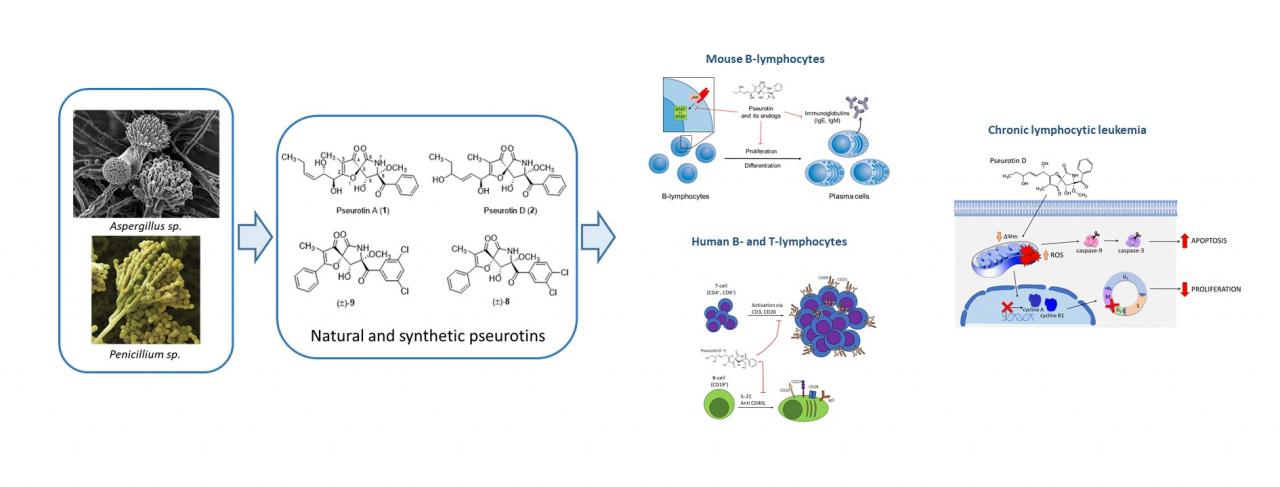Mgr. Ondřej Vašíček Ph.D.
Research Topic: NATURAL AND SYNTHETIC PSEUROTIN ALKALOIDS AS IMMUNOSUPPRESSIVE COMPOUNDS
Small organic molecules isolated from fungi represent a highly attractive compounds that have a potential for the modulation of specific physiological processes by affecting individual cellular pathways. A particularly interesting group of such fungal secondary metabolites is pseurotins, ergot-like alkaloids containing a 1-oxa-7-azaspiro[4.4]non-2-ene-4,6-dione core, that comprise a family with over twenty five members such as azaspirene and synerazol. Pseurotin A, the first described member, was isolated in 1976 from the fermentation broth of Pseudeurotium ovalis Stolk (Ascomy-cetes) by Bloch. Further, pseurotins are also produced by Aspergillus fumigatus (e.g. pseurotin A, 8- O-demethylpseurotin A, pseurotin D, F1/F2, 11- O-methylpseurotin A, and synerazol) as well as by Neosartorya sp. producing azaspirene, and Penicillium strains producing pseurotin A. Pseurotins have interesting biological activities. In addition to their antifungal and antibiotic activities, pseurotins were shown to modulate cell differentiation, to possess anti-angiogenic activity, and to inhibit endothelial cell migration, and to regulate enzymes of cellular metabolism.

Natural pseurotins and analogs thereof inhibit activation of B-cells and differentiation into the plasma cells: We have described our biological investigation of natural pseurotins and several fully synthetic pseurotin analogs thereof. We were able to show that selected analogs decrease the production of IgE in stimulated B-cell cultures with potency comparable to that of natural pseurotins A and D. Our experiments demonstrated, for the first time, that pseurotins A and D, and potent pseurotin analogs inhibit the activation of B-cells via the STAT signaling pathway, resulting in decreased proliferation and differentiation of B-cells. Furthermore, pseurotin D reduced delayed type hypersensitivity response in vivo that suggest reduced adverse response to OVA in pseurotin D treated mice. Although further research is required to fully understand the mechanisms by which pseurotins act on cells of the immune system, our findings are new and advance the current understanding. Ultimately, the work could assist in identification of potent small-molecule inhibitors of IgE production based on the scaffold of natural pseurotins for further development in the context of IgE-related diseases.
Natural pseurotins inhibit proliferation and inflammatory responses through the inactivation of STAT signaling pathways in macrophages: This study has demonstrated for the first time that natural pseurotins inhibited RAW264.7 macrophage proliferation and suppressed their responses to LPS-stimulation. These effects were connected with inhibition phosphorylation of several members of the STAT signaling family and EKR1/2 from the MAPK family in LPS activated macrophages. Moreover, these signaling events contribute to decreased mitochondrial respiration in macrophages. Additionally, pseurotin D showed a greater ability to inhibit macrophage proliferation and responses of macrophages on LPS stimulation than pseurotin A. It seem that structure of natural pseurtoins play a key role and have the potential to utilize these compounds in further investigation as JAK/STAT signaling pathway inhibitors and for the treatment of inflammation related pathological processes but detailed study of the exact site of action is needed.
Pseurotin D inhibits the activation of human lymphocytes: We suggest that pseurotin D has a potential to inhibit T-cell activation, including T-cell proliferation, the expression of surface markers, and the production of pro-inflammatory mediators. Concerning B-cells, pseurotin D did not significantly inhibit their activation; however, it affected their differentiation as it led to a complex change in the surface expression of differentiation markers. Overall, these data widen our knowledge of the pseurotin-mediated modulation of immune response and support the vision that the unique structure of pseurotins can provide inspiration for the design of new chemotypes of small molecules targeting pathologically defective immune system functions under disease conditions.
Pseurotin D induces apoptosis through targeting redox sensi-tive pathways in human lymphoid leukemia cells: Pseurotins are able to reduce the proliferation of lymphoma cells and also induce their apoptosis via the mitochondria and ROS-related caspase pathway. Our results highlight the fundamental role of natural small molecules which could represent a potent new group of drugs for the treatment of lymphomas.

